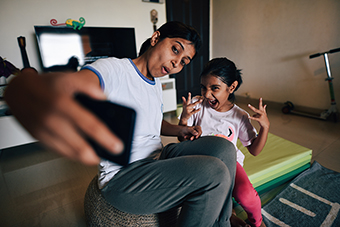Sharing on parenting: Getting advice through social media


Sharing on parenting: Getting advice through social media
Parents of young children often have questions about how to care for their child. The C.S. Mott Children’s Hospital National Poll on Children’s Health asked a national sample of parents of children 0-4 years about using social media to share parenting ideas.
Most parents of young children (80%) say they use social media to discuss parenting topics. More mothers than fathers use social media to look for parenting advice or information (84% vs 69%) or share their experiences (63% vs 42%). Parents report using social media to learn about or discuss toilet training (44%), getting kids to sleep (42%), nutrition/breastfeeding (37%), discipline (37%), behavior problems (33%), vaccination (26%), daycare/preschool (24%), and getting along with other kids (21%).
Parents say they discuss these topics on social media because they want to hear different ideas (62%), it’s convenient (27%), they want to do things differently than their parents (25%), they don’t have family/friends nearby (9%), they don’t have enough opportunities to ask their child’s healthcare provider (7%), or they are too embarrassed to ask in person (5%). Parents rate social media as very useful for getting new ideas to try (44%), making them feel like they’re not alone (37%), learning what not to do (33%), deciding whether to buy certain products (25%) or when to take their child to the doctor (11%), and helping them worry less (16%).
Most parents (72%) identify at least one aspect of social media sharing that concerns them, such as seeing other parents doing things that are unhealthy or dangerous for their child (43%), difficulty distinguishing good vs bad advice (40%), others finding out their family’s private information (38%) or sharing photos of their child without their child’s permission (31%). Many feel other parents overshare on social media by bragging about their child (77%), sharing too often or too much (76%), giving personal information that could identify the child’s location (63%), giving information that might embarrass the child when they are older (62%), posting information that is fake or false (48%), or sharing inappropriate photos of a child’s body (27%).
To limit social media sharing about their child, parents use privacy settings to restrict who can see their posts (57%), avoid posting photos or videos of their child (30%), only participate in closed groups (22%), use their child’s initials instead of their name (5%), or block out their child’s face (5%); one-third (31%) say they do not discuss their child at all on social media.

Highlights
- 4 in 5 parents of young children use social media to discuss parenting topics.
- Nearly half of parents rate social media as very useful for getting new ideas to try.
- 2 in 5 parents think it’s difficult to distinguish good vs bad advice on social media.
- More than half of parents use privacy settings or restrict who can see posts about their children.
Implications
For first-time parents, the infant and toddler years bring joy and excitement as well as a myriad of decisions about how best to take care of their child. Parents with older children have the benefit of experience but may encounter new challenges because each child has their own personality and temperament. This Mott Poll confirms that most mothers and over two-thirds of fathers use social media to discuss challenges and ask for advice on parenting their child 0-4 years. This represents a sizeable increase since the Mott Poll last explored this topic in 2015.
Common topics of discussion on social media include a child’s daily routine of sleeping and eating, key milestones like toilet training and adjusting to daycare or preschool, and longer-term challenges like discipline. Often there isn’t a clear “best” way to do things; many parents use a trial-and-error approach to find what works for their child. This is consistent with poll results that the biggest reason parents turn to social media is to get ideas and strategies to try.
The convenience of social media allows parents to seek information or ask for advice as soon as a new parenting challenge arises; they don’t need to wait for the child’s next check-up or visit with grandparents or other experienced relatives. Social media can be particularly helpful for parents who don’t have regular contact with family or friends who are experienced with child-rearing and can offer tips for parenting challenges. In contrast, 1 in 4 parents in this Mott Poll said they sought advice on social media specifically because they want to do things differently than what their own parents did.
Parents acknowledge concerns about sharing too much about their children on social media. Most common are problems of annoyance, such as a parent bragging or posting too often. Other concerns pertain to privacy, such as postings that reveal personal information about the child or family. One aspect to consider is whether the child may one day be embarrassed about having personal information shared without their consent. Parents should also consult with parents of other children in photos for approval before sharing them on social media.
Oversharing may encompass things like revealing when the family home may be unattended such as during a family vacation, or even creating a risk of identity theft. While some parents use privacy settings or limit their postings to closed groups to limit the risk of information getting out, this Mott Poll shows that others may want to increase their use of privacy settings and other strategies to limit the amount of personal information in their postings.
An emerging concern is parents sharing information that is false or fake, whether knowingly or unknowingly. In this poll, 4 in 10 parents indicated it can be difficult to distinguish good vs bad advice on social media. It’s important that parents can identify reputable sources of information about child health and parenting, and that they consult those sources before attempting new strategies with their own child.
One in ten parents of young children who use social media rated it as very useful in deciding when to take their child to the doctor. However, with young children, it is usually prudent to contact the child’s primary care provider with any questions. Telehealth visits and messaging through patient portals are efficient ways for parents to ask for guidance; this allows the provider to help determine if the child needs to be seen in person. Additionally, parents should keep a list of questions and topics to ask about during well-child visits.

Data Source & Methods
This report presents findings from a nationally representative household survey conducted exclusively by Ipsos Public Affairs, LLC (Ipsos) for C.S. Mott Children’s Hospital. The survey was administered in August 2023 to a randomly selected, stratified group of adults who were parents of at least one child age 0-18 years living in their household (n=2,044). Adults were selected from Ipsos’s web-enabled KnowledgePanel® that closely resembles the U.S. population. The sample was subsequently weighted to reflect population figures from the Census Bureau. The survey completion rate was 62% among panel members contacted to participate. This report is based on responses from 614 parents with at least one child age 0-4. The margin of error for results presented in this report is ±2 to 5 percentage points and higher among subgroups.
Findings from the C.S. Mott Children’s Hospital National Poll on Children’s Health do not represent the opinions of the University of Michigan. The University of Michigan reserves all rights over this material.
Citation
Clark SJ, Schultz SL, Gebremariam A, Singer DC, Woolford SJ. Sharing on parenting: Getting advice through social media. C.S. Mott Children's Hospital National Poll on Children's Health, University of Michigan. Vol 44, Issue 3, November 2023. Available at: https://mottpoll.org/reports/sharing-parenting-getting-advice-through-social-media.

